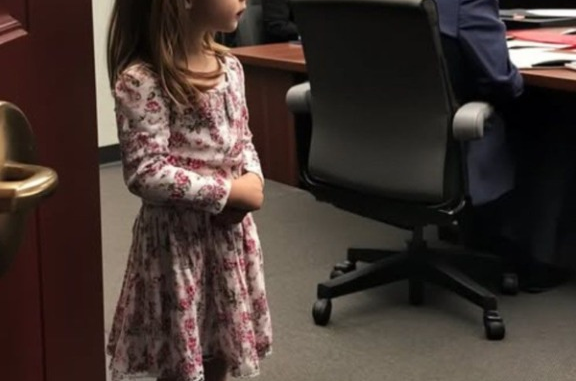
In his final days, Mr. Lewis easily recognized the shallow efforts of his family. But no one foresaw the moment when a young girl’s simple compassion would completely upend the reading of his will.
At 83, Mr. Lewis sat back in his beloved leather chair—the same one that had supported him through countless long nights—and reflected on a life of hard work. From humble beginnings, he built a thriving business by his 40s, though wealth alone never defined him.
Throughout his life, Mr. Lewis opened his heart and home to those in need. In addition to raising four biological children, he adopted four more and provided a home for countless foster kids.
“You always seem to find room for one more,” his late wife would say with a warm smile, watching him welcome each new child.
Whether through generous donations or fatherly love, Mr. Lewis had always believed in giving back.
But as time passed, the house that had once buzzed with life grew still. His grown children—both biological and adopted—visited rarely, and usually only when they needed something. Conversations always followed a predictable pattern:
“Dad, you know how hard it is these days,” his oldest son, Richard, would begin, barely making eye contact. “Could you help me get through the month?”
His daughter Olivia would echo the same sentiment: “Dad, the kids’ school fees are just too high…”
Even the grandchildren appeared only during the holidays, viewing him more as a source of money than as their grandfather. Though he loved them dearly, Mr. Lewis saw the uncomfortable truth—they only cared about what he could give them.
When Mr. Lewis turned 83, his doctor delivered devastating news: “You have about a month left, Mr. Lewis.”
He accepted the diagnosis with quiet dignity. That evening, he called his family to share the news.
Soon, they descended on his mansion from around the world. Richard arrived with his wife and three children, feigning the role of devoted son. Olivia followed with her daughters, forcing a strained smile. Even his adopted children suddenly cleared their schedules to return home.
“Dad, we’re here now,” Richard said, patting his father’s shoulder.
“We’ve got you, Grandpa,” said one of the grandchildren, Willow, her attention mostly fixed on her phone.
For weeks, the family hovered, offering false smiles and hollow words. Olivia would ask if he needed tea—one she hadn’t made herself. Richard’s youngest son, Derek, would reassure Mr. Lewis they’d “take care of everything,” while eyeing the valuable paintings on the walls.
Mr. Lewis watched it all with a heavy heart. They weren’t here out of love; they were positioning themselves for a larger inheritance. But he wasn’t fooled.
When he passed away peacefully in his sleep, the family wasted no time focusing on the will. On the day of the reading, they packed into the lawyer’s office—impatient, entitled, and no longer pretending to mourn.
“I bet he left the most to me,” Olivia whispered smugly.
“You wish,” Richard retorted. “Dad always respected my business sense.”
Their bickering continued until the lawyer, Mr. Alaric, entered the room. To everyone’s surprise, a young girl of about 13 walked in beside him.
“Who’s the kid?” Richard asked, visibly confused.
“This,” Mr. Alaric announced, “is Harper. She is here for the reading of the will.”
Confusion spread across the room. Harper stood quietly, an unexpected figure in the midst of greedy relatives.
After a tense silence, Mr. Alaric continued. “None of you are aware, but Mr. Lewis named Harper as the sole heir to his fortune.”
The room erupted in outrage. Richard jumped up, furious. “She’s just a kid! This can’t be real.”
“This is absurd!” Olivia cried. “We’re his family. This must be a scam!”
Mr. Alaric raised a hand. “Mr. Lewis made this decision knowingly. He left a letter explaining why. I will read it now.”
The lawyer unfolded the letter:
Dear Family,
I know this decision may upset you, but please listen. In these past few years, Harper has been the light in my life. She lives next door and noticed long before anyone else that I was struggling. She would visit every day—not to ask for anything, but simply to share time, laughter, and friendship. She made me feel seen and cared for when I felt alone.
Harper is also facing a battle no child should face. She was recently diagnosed with a terminal illness. Despite her circumstances, she dreams of seeing the world and living fully in the time she has left. I want to make that possible for her. I trust you will understand and support this choice.
The room fell silent. Olivia wiped away tears. Even Richard appeared shaken.
Harper spoke softly: “Mr. Lewis was my friend. I never wanted his money. I just loved spending time with him.”
Richard cleared his throat awkwardly. “Harper, I’m… sorry. We didn’t know.”
Harper replied simply: “I’m going to use this gift to travel with my parents, eat ice cream for breakfast, and create memories. And when I’m gone, the rest will go to help other kids like me.”
Tears streamed down Olivia’s face. “You’re so brave. I hope you get to do everything you dream of.”
In the months that followed, Harper did exactly that—traveling the world with her parents, experiencing life with joy and gratitude. She visited the Eiffel Tower, played in the ocean, and cherished every precious moment.
When her time came, Harper passed peacefully, surrounded by loved ones. In accordance with her wishes, the remaining fortune was donated to charities supporting children with cancer and their families.
Harper’s story left a lasting impact—not just through her generosity, but by teaching Mr. Lewis’ family a profound lesson about love, kindness, and the true meaning of life.
Leave a Reply